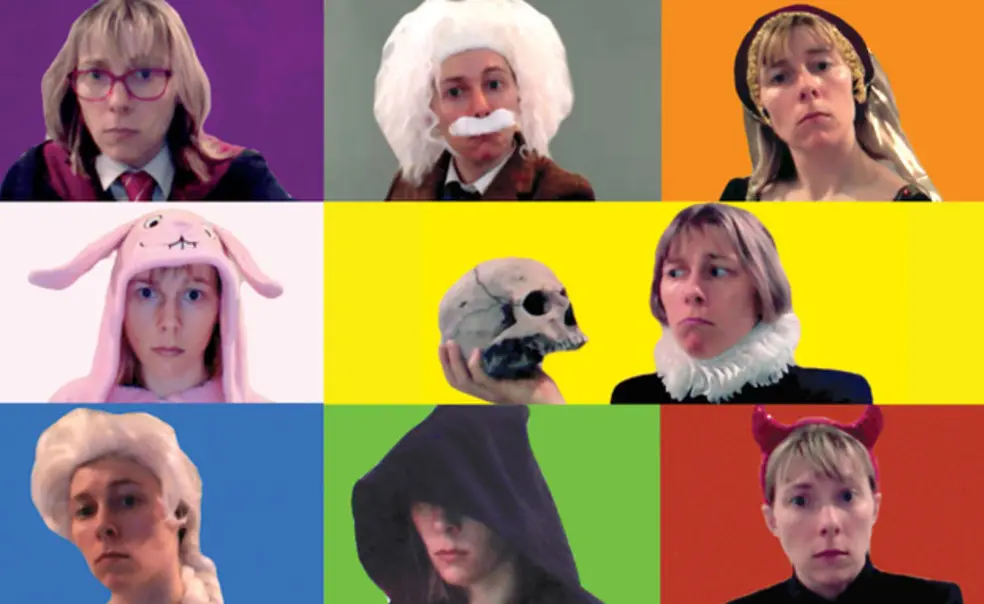To Engage Students On Zoom, Elyse Graham ’07 Became a Performer
“I ran one class meeting as a Dungeons and Dragons session”
Elyse Graham ’07 is a professor at Stony Brook University in New York state.
I teach at a large public university. My department set up a dead man’s switch — everyone checks in on a Google form regularly — to ensure our students will be taken care of if anyone falls sick. We moved our classes onto Zoom, which lets us meet by video conference; since one of the platform’s features is the ability to change your video background, as though you have a green screen, I asked my students what background I should use for class meetings. One suggested a bunker; another suggested the basement from the movie Parasite.
The task, for teachers and students both, was daunting: Studies show that only 3 percent of students in the biggest online classes finish those classes. Something doesn’t work in online education. Out of desperation, I turned to video apps popular among teens: Twitch, YouTube, TikTok. Maybe Generation Z, the cohort my students belong to, could teach me how to make compelling online videos.
“Do you know what a YouTuber is?” I asked my father.
“Isn’t that a German submarine?” he said.
Dances and skits on these apps often require tremendous preparation, as though to point up the contradiction between the hidden labor and the spontaneous impression of the videos, which may last for mere seconds: days of rehearsing for a 15-second dance. I learned to liven dead air with background music; to make my points punchy and telegraphic; to break classes into shorter segments — 14 minutes long, say — with rests like breakout sessions. I wore costumes: wizard, Anne Boleyn, snow queen, Shakespeare. I ran one class meeting as a Dungeons and Dragons session, set in a realm devastated by plague. Anything to keep students logging in. One colleague reported that live attendance for his 9 a.m. lecture was zero.
The sociologist Erving Goffman used the term backstage to refer to spaces out of public view; we need time backstage to work up a strong performance onstage. In this new world, the stage has shrunk — to a few inches of screen, to info-bite timespans strung clip by clip into facsimiles of living hours — while the backstage gets bigger and messier every day.
Stores reported that sales of dress shirts were soaring, while trouser sales idled — because people dressed formally “from the waist up” for video meetings, an executive said. But outside the camera’s view, we were working as furiously as ducks paddling below the surface. Who cares if I wore bedroom slippers to class? I lost days to planning that Dungeons and Dragons session. (In our adventure, a ragtag band of heroes braved the perils of Long Island to recover valuable scrolls from a once-great center of learning, now abandoned.)
My classes stayed mostly full, but my students had plenty of legitimate gripes about the new situation: “It’s hard to keep the same focus as being in a classroom.” “I can hear my parents all the time, even though I’m in a separate room to do homework and stuff.” “It’s really loud, and I have no privacy.” “I’m tired of doing laundry in the bathtub.” “I worked at a restaurant. I hope we can reopen soon so that we can get some money again.” “My parents can’t go to work anymore, which means I have to take every shift at work I can get. It’s hard to keep up.”
Hair fell over my face; hair fell over my students’ faces. Barbershops had long since closed. Even before the pandemic, trendwatchers said the mullet was making a comeback. A barber told my friend, back then, that ever more customers were requesting mullets: “Shorter on the sides, long in the back.” Before he took out the scissors, the barber made them say the word “mullet” — just as a tattooist does due diligence before giving a face tattoo. Now we all have mullets; the pandemic took away that choice, too.
PAW reached out to alumni who are on the front lines of the COVID-19 crisis or are affected by it in different ways. Read their essays here. Write to us at paw@princeton.edu with your own story.












No responses yet